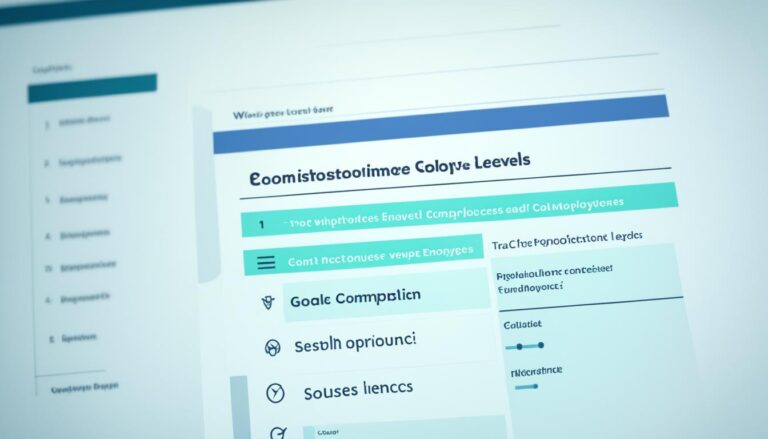Discover Life-Changing Goal Ideas for Success

Are you ready to take charge of your life and unlock your true potential? Setting goals can be the key to achieving your wildest dreams and transforming your life for the better. But how do you come up with goal ideas that will truly make a difference? How can you ensure that your goals are not just wishful thinking, but actionable steps towards a brighter future?
In this article, we will delve into the world of goal setting and explore a variety of goal ideas that can bring about meaningful change. Whether you’re looking to improve your personal life, advance your career, or find a sense of purpose, we’ve got you covered. Get ready to embark on a journey of self-discovery and empowerment as we uncover the secrets to setting life-changing goals.
Key Takeaways:
- Setting goals is crucial for personal and professional growth.
- Clarifying your goals can give you direction, motivation, and a sense of purpose.
- Journaling about life goals has been shown to have health benefits.
Why You Should Set Life Goals
Setting life goals is essential for personal and professional growth. It is the key to unlocking your full potential and living a purposeful, fulfilled life. By setting clear goals, you gain a sense of direction and motivation, allowing you to make intentional choices that align with your aspirations. In this section, we will explore the importance of setting goals, the benefits they bring, and the purpose they provide.

Clarify Your Priorities and Find Purpose
When you set life goals, you gain clarity on what truly matters to you. It helps you prioritize your time, energy, and resources towards what is most important. By defining your objectives, whether they are short-term aims or long-term aspirations, you can make meaningful progress and see tangible results. Goals give you a purpose, providing a roadmap for the future.
Achieve Financial Security, Personal Growth, and Success
Setting life goals allows you to focus on what is necessary to achieve financial security, personal growth, and overall success. Whether your goals involve advancing in your career, starting your own business, or improving your financial well-being, having goals provides a sense of direction and enables you to take deliberate actions towards those goals.
Improve Overall Well-being
Surprisingly, setting and communicating your life goals can have significant health benefits. Research has shown that individuals who write or talk about their goals experience a reduction in physical illness. By aligning your actions with your goals and aspirations, you can lead a more balanced and fulfilling life, promoting overall well-being.
Setting life goals is a rewarding journey that empowers you to shape your future and live a life with purpose. By clarifying your priorities, focusing on what matters, and pursuing your dreams, you ensure that you don’t wake up one day with regrets. So, take the time to set meaningful goals and enjoy the many benefits they bring.
9 Examples of Meaningful Life Goals
Ready to embark on a journey of self-discovery and personal growth? Setting meaningful life goals can bring fulfillment, success, and a sense of purpose to your life. Here are nine examples of life goals that can inspire and motivate you to create the life you truly desire:
- Challenge Yourself: Push your boundaries and step out of your comfort zone every day. Embrace new experiences and embrace the unknown to unlock your full potential.
- Mindfulness: Practice mindfulness to cultivate inner peace, reduce stress, and enhance personal growth. Embrace the present moment, enhance self-awareness, and nurture a deep connection with yourself and the world around you.
- Pursue Your Professional Dream: Have a burning desire to pursue your passion? Make it your goal to turn your dreams into reality. Take proactive steps towards a fulfilling career and make a positive impact in your chosen field.
- Attain Financial Freedom: Take control of your financial future and set goals to achieve financial stability and independence. Invest wisely, save diligently, and explore new avenues for generating income.
- Self-Care: Prioritize self-care as an essential part of your goal-setting journey. Focus on nourishing your physical, mental, and emotional well-being through healthy habits, regular exercise, and self-reflection.
- Learn Something New: Embrace lifelong learning and make it your mission to continuously acquire new knowledge and skills. Explore subjects that fascinate you, pursue hobbies that ignite your passion, and broaden your horizons.
- Expand Your Family: If starting or expanding a family is important to you, make it a goal to nurture meaningful relationships and create a loving and supportive environment for your loved ones.
- Embark on a Creative Project: Unleash your creativity by undertaking a significant creative project. Whether it’s writing a book, composing music, or creating artwork, let your imagination soar and express yourself through your chosen medium.
- Give Back: Make a positive impact on your community or the world by giving back. Dedicate time and resources to philanthropy, volunteerism, or social activism, and contribute to causes that resonate with your values.

As you embark on your personal journey towards meaningful life goals, remember that each goal is unique to you. Embrace the challenges, stay committed, and celebrate every milestone along the way. Your journey towards a fulfilling and purposeful life starts now!
| Goal | Description |
|---|---|
| Challenge Yourself | Push your boundaries and step out of your comfort zone every day. |
| Mindfulness | Practice mindfulness to cultivate inner peace, reduce stress, and enhance personal growth. |
| Pursue Your Professional Dream | Make it your goal to turn your dreams into reality and make a positive impact in your chosen field. |
| Attain Financial Freedom | Set goals to achieve financial stability and independence. |
| Self-Care | Prioritize self-care and focus on nourishing your physical, mental, and emotional well-being. |
| Learn Something New | Embrace lifelong learning and continuously acquire new knowledge and skills. |
| Expand Your Family | Nurture meaningful relationships and create a loving and supportive environment for your loved ones. |
| Embark on a Creative Project | Unleash your creativity by undertaking a significant creative project. |
| Give Back | Make a positive impact on your community or the world through philanthropy, volunteerism, or social activism. |
How to Motivate Yourself to Achieve Life Goals: 4 Tips
Achieving your life goals can sometimes feel like a daunting task, but it’s essential to stay motivated and focused on your journey. By implementing a few strategies, you can maintain your enthusiasm and overcome any challenges that come your way. Here are four effective tips to help you stay motivated and achieve your life goals:
Create a Vision Board
One powerful technique for staying motivated is to create a vision board. A vision board is a visual representation of your goals, dreams, and aspirations. By gathering inspiring images and quotes that resonate with your objectives, you can create a visual reminder of what you want to achieve. Place your vision board in a prominent location where you’ll see it every day, such as your bedroom or office. This constant visual reminder will help keep you focused, motivated, and aligned with your goals.
Set SMART Goals
Another key to staying motivated is to set SMART goals. SMART is an acronym for Specific, Measurable, Attainable, Relevant, and Time-bound. When your goals are SMART, they have a clear structure and direction, making it easier to track your progress and stay motivated. Rather than setting vague and general goals, break them down into specific and actionable steps. For example, instead of saying, “I want to lose weight,” you can set a SMART goal like, “I want to lose 10 pounds within three months by exercising three times a week and following a healthy diet.”
Create Milestones
Breaking down your life goals into smaller milestones is an effective strategy for staying motivated. Milestones serve as checkpoints along your journey, allowing you to celebrate your progress and stay engaged with your goals. By setting milestone targets, you can track your achievements and feel a sense of accomplishment with each step forward. For example, if your goal is to start your own business, you can create milestones such as researching the market, writing a business plan, securing funding, and launching your product or service.
Develop an Action Plan
An action plan is a detailed roadmap that outlines the specific tasks and deadlines needed to achieve your goals. By breaking your goals into smaller actionable steps, you can combat procrastination and maintain momentum. Start by identifying the key tasks required to reach your goals and assign realistic deadlines to each task. Then, prioritize your tasks and create a schedule or to-do list to ensure you stay on track. Regularly review and update your action plan to adapt to any changes or challenges that arise along the way.
By incorporating these strategies into your goal-setting process, you can enhance your motivation and increase your chances of achieving your life goals. Remember, staying motivated is essential, and with the right tools and mindset, you can overcome obstacles and create the life you envision.
| Benefits of Staying Motivated | Effective Techniques for Staying Motivated |
|---|---|
|
|
How to Answer the “Tell Me About Yourself” Question in an Interview
The “tell me about yourself” question is a common and important part of job interviews. It serves as an opportunity for you to make a strong first impression and showcase your qualifications. To answer this question effectively, it’s essential to structure your response and focus on key elements that highlight your past experience, present role, and future goals.
Mention Relevant Past Experiences
When answering the “tell me about yourself” question, start by mentioning a few of your most relevant and impressive past experiences. These experiences should align with the job you’re applying for and demonstrate your skills and abilities. Highlight specific accomplishments, projects, or roles that showcase your expertise and make you a valuable candidate.
Highlight How Your Present Role Relates to the Job
Next, emphasize how your current role is relevant to the position you’re interviewing for. Explain how the skills and knowledge you’ve gained in your present role can be transferable and beneficial to the new job. This demonstrates your ability to apply your experience in a new context and shows the interviewer that you understand the requirements of the position.
Discuss Your Future Goals in Relation to the Company and Position
Finally, discuss your future goals in relation to the company and position you’re interviewing for. Show enthusiasm and a genuine interest in the company’s mission and values. Align your goals with the opportunities that the role presents, emphasizing how you plan to grow and contribute to the organization. This conveys your ambition, motivation, and long-term commitment.

Remember, when answering the “tell me about yourself” question, it’s important to avoid simply summarizing your resume. Instead, use this opportunity to provide insights into your experiences, skills, and accomplishments that make you the ideal candidate for the job.
By structuring your answer around relevant past experiences, highlighting the connection between your present role and the job, and discussing your future goals in relation to the company, you can deliver a polished and impactful response that leaves a lasting impression on the interviewer.
Tell Me About Yourself: Tips for Crafting a Polished Response
When it comes to job interviews, one of the most common and important questions you’ll encounter is “tell me about yourself.” This question provides an opportunity for you to make a memorable first impression and showcase your strengths and qualifications. To ensure your response is tailored and impactful, consider the following tips:
Focus on Your Quantifiable Strengths and Achievements
Highlight your accomplishments and skills that are measurable and relevant to the position you’re applying for. This could include specific projects you’ve successfully completed, targets you’ve exceeded, or awards you’ve received. By focusing on quantifiable strengths, you demonstrate your value and potential impact to the interviewer.
Showcase Your Personality and Interests
Your personality can set you apart from other candidates, so don’t be afraid to let it shine. Share interests and traits that are relevant to the job and highlight how they align with the company culture and values. This not only provides insight into who you are but also demonstrates your fit within the organization.
Tailor Your Response to the Job and Company
Each job and company is unique, so it’s crucial to customize your answer to match their specific requirements and priorities. Research the organization beforehand to understand their values, goals, and challenges. Use this knowledge to craft a response that showcases your suitability and aligns with their expectations.
Avoid Summarizing Your Resume
While it’s important to provide relevant information, avoid simply summarizing your resume. Instead, focus on sharing experiences and achievements that make you stand out as a candidate. This allows you to provide deeper insights and showcase your unique value beyond what is already mentioned in your application materials.
Rehearse Your Response
Practice makes perfect, so take the time to rehearse your response to the “tell me about yourself” question. However, be cautious not to sound overly rehearsed or robotic. Aim for a natural and confident delivery that highlights your key points without sounding scripted.
By following these tips, you can craft a polished and tailored response to the “tell me about yourself” question that leaves a lasting impression on the interviewer. Now, let’s take a look at an example table that showcases how different candidates can approach this question:

| Candidate | Strengths and Achievements | Personality and Interests | Tailored Response |
|---|---|---|---|
| Candidate A | Consistently exceeded sales targets by 20% | Passionate about volunteer work and community engagement | Highlight sales achievements and how they align with the company’s focus on driving revenue. Discuss the candidate’s involvement in community initiatives and how it resonates with the company’s corporate social responsibility values. |
| Candidate B | Developed and implemented an innovative cost-saving strategy that resulted in a 15% reduction in expenses | Enjoys problem-solving and finding creative solutions | Emphasize the cost-saving strategy and its impact on the previous company’s financial performance. Discuss the candidate’s passion for problem-solving and how it aligns with the company’s focus on efficiency and innovation. |
| Candidate C | Led a cross-functional team in successfully launching a new product line | Enthusiastic about continuous learning and personal development | Highlight the leadership experience and the ability to drive successful product launches. Discuss the candidate’s passion for learning and how it aligns with the company’s commitment to innovation and growth. |
Designing Your Life: The Importance of Setting Life Goals
Designing your life with well-thought-out life goals is the key to living a purposeful and balanced life. By setting goals in various areas, you can create a life that aligns with your values and aspirations.
Areas to Consider:
- Personal Development: Continuously strive to grow and improve in all aspects of your life.
- Health and Fitness: Prioritize your well-being through exercise, nutrition, and self-care.
- Family and Friends: Cultivate meaningful relationships and invest in your loved ones.
- Hobbies and Passions: Find activities that bring you joy and make time for them.
- Financial Goals: Set objectives to achieve financial stability and independence.
- Career Goals: Define milestones and ambitions to advance in your profession.
- Adventure Goals: Seek new experiences and embrace challenges outside your comfort zone.
- Travel Goals: Explore different cultures and destinations that ignite your curiosity.
- Lifestyle Goals: Create a balanced and fulfilling lifestyle tailored to your preferences.
- Leaving a Legacy: Make a positive impact and leave a lasting imprint on the world.
By mapping out your life goals, you provide yourself with a roadmap for personal growth and fulfillment. Designing your life is a continuous process that allows you to adapt and evolve as you progress. It’s about intentional living, ensuring that your actions align with your aspirations.
Remember, setting life goals is not about achieving external validation or societal expectations. It’s about crafting a life that is truly meaningful to you. Take the time to reflect on your values, passions, and dreams, and use them as fuel to guide your goal-setting process.
Life is a journey, and by designing your life through the establishment of meaningful and purposeful goals, you can create a life that brings you joy, fulfillment, and satisfaction.
Conclusion
Setting and achieving life goals is crucial for personal and professional success. It allows you to design your own unique life, living with no regrets. By setting clear goals and taking intentional action, you can create a life filled with purpose, fulfillment, and accomplishment.
Whether it’s challenging yourself to grow, pursuing your dreams with determination, prioritizing your health and relationships, or making a positive impact on others, having life goals empowers you to live the life you truly desire.
Remember, success is not a destination, but a journey. By setting meaningful goals and working towards them, you are actively designing the life you want to live. Don’t leave your future to chance; take control and embrace the power of setting and achieving life goals. Start today and unlock your true potential!






